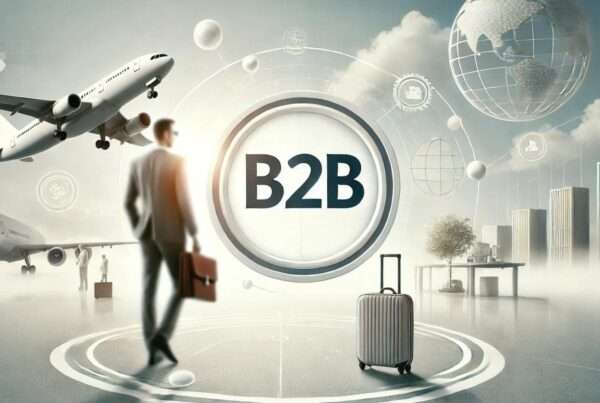
The complexities of business-to-business transactions can be very difficult. The need for efficient and streamlined processes is more crucial than ever. Enter the B2B marketplace, revolutionizing how businesses interact and transact.
These platforms offer a solution to the challenges of traditional B2B trading, providing a digital space where companies can connect, communicate, and conduct transactions with ease.
This guide gets into the essence of B2B marketplaces and the manifold benefits they bring to the table.
What is a B2B Marketplace?
A B2B marketplace is an online platform where businesses sell products or services to other businesses. It’s a digital marketplace that connects buyers and sellers, streamlining B2B transactions.
Unlike a B2C marketplace, a B2B e-commerce platform focuses on wholesale transactions, often involving bulk orders. Key players like Amazon Business and Global Sources have revolutionized how B2B sales occur, offering a wide range of products at wholesale prices.
These marketplaces provide a convenient, efficient way for B2B buyers and suppliers to connect and conduct business, making the B2B e-commerce market more accessible and competitive.
Difference Between B2B and B2C Marketplaces
B2B (Business-to-Business) and B2C (Business-to-Consumer) marketplaces cater to different audiences. B2B marketplaces, like Amazon Business and Global Sources, connect businesses with suppliers, offering wholesale prices and focusing on bulk transactions. These platforms are designed for B2B sales and transactions, serving industries and companies rather than individual consumers.
On the other hand, B2C marketplaces, such as Amazon and eBay, target individual consumers, offering a wide range of products for personal use. B2C platforms prioritize user experience, easy navigation, and consumer-friendly policies, while B2B platforms emphasize features like bulk ordering, specialized services, and business-oriented payment options.
Benefits and Drawbacks of Using a B2B Platform
Benefits of B2B Marketplace:
- Access to a Global Market: B2B marketplaces like Global Sources and Amazon Business provide businesses with the opportunity to reach a global audience. This exposure can lead to increased sales and the expansion of your customer base.
- Efficient Transaction Process: Online B2B platforms streamline the transaction process, making it easier for buyers and sellers to conduct business. This efficiency can lead to faster sales cycles and reduced operational costs.
- Wide Range of Products and Services: B2B marketplaces offer a diverse range of products and services, allowing businesses to find everything they need in one place. This convenience can save time and resources.
- Enhanced Visibility for Suppliers: Suppliers can showcase their products on a digital marketplace, increasing their visibility to potential buyers. This can help small and medium-sized businesses compete with larger companies.
- Improved Buyer-Seller Relationships: B2B platforms facilitate direct communication between buyers and sellers, leading to stronger relationships and better business outcomes. Buyers can easily find the best B2B marketplace that meets their specific needs.
Drawbacks of the B2B Marketplace:
- Complex Integration: Integrating a B2B e-commerce platform with existing business systems can be complex. This often requires significant time and resources.
- Limited Personalization: B2B transactions often require personalized service. Online B2B marketplaces can struggle to provide the same level of personalization as traditional sales channels.
- Competition: With many businesses on the same platform, competition can be fierce. Standing out in a crowded digital marketplace can be challenging.
- Dependence on Platform: Relying heavily on a B2B e-commerce marketplace can lead to dependence. This can be risky if the platform’s policies change or if it experiences downtime.
- Security Concerns: Online B2B marketplaces can be targets for cyber attacks. Ensuring the security of sensitive information is a constant concern.
Key Features of B2B E-commerce Marketplace
B2B e-commerce marketplaces provide a digital platform for wholesale business transactions between B2B sellers and buyers. These marketplaces are designed to cater to the unique needs of B2B customers, offering a wide range of products and services. Key features of these platforms include:
- A multi-vendor marketplace model allows various suppliers to sell products to B2B buyers.
- Advanced marketplace software and solutions to streamline the B2B supply chain.
- Global reach, connecting local marketplaces to the larger global B2B e-commerce market.
- Customization options to meet the specific requirements of different B2B industry sectors.
- Integration with existing business systems for seamless operations.
Successful b2b marketplaces like Amazon Business and Alibaba have set the standard in the industry, offering a reliable and efficient platform for b2b commerce. By choosing the right B2B marketplace, businesses can enhance their online presence and tap into new market opportunities.
Trends in B2B E-commerce Marketplace
- Global Expansion: B2B marketplaces are going global, allowing businesses to tap into new markets and customer bases.
- Vertical and Horizontal Marketplaces: We’re seeing a rise in both vertical marketplaces, focusing on specific industries, and horizontal marketplaces that cater to a broader range of needs.
- Personalization: B2B platforms are increasingly using AI and machine learning to offer personalized experiences to buyers and sellers.
- Mobile Optimization: With the surge in mobile usage, successful B2B marketplaces ensure their platforms are mobile-friendly.
- Multi-Vendor Platforms: The popularity of multi-vendor marketplace platforms is growing, as they allow multiple sellers to offer their products in one place.
- Subscription Models: Some leading B2B marketplaces are experimenting with subscription models to ensure steady revenue streams.
- Integration with B2B Supply Chain: Seamless integration with the B2B supply chain is becoming crucial for efficiency.
- Digital Payments: The shift towards digital payment methods is streamlining transactions in B2B e-commerce.
- Data Security: As more businesses use B2B marketplaces, the emphasis on data security and privacy is increasing.
Conclusion
The B2B marketplace has transformed the landscape of business transactions, offering a plethora ofadvantages including efficiency, convenience, and access to a global network. They serve as a one-stop-shop for businesses looking to buy or sell products and services, streamlining the procurement process and fostering growth. As the digital economy continues to evolve, the significance of B2B platforms is set to rise, making them an indispensable tool for companies worldwide. Have you explored the potential of B2B marketplaces for your business?
FAQs
1. Can B2B Marketplaces be used for international trade?
Yes, many B2B marketplaces facilitate international trade, offering features like multi-language support and cross-border payment solutions.
2. How do B2B Marketplaces ensure the quality of products and services?
Most B2B marketplaces have quality control measures, such as seller verification, product certifications, and buyer reviews, to ensure the reliability of listings.
3. What types of products and services can be found on B2B Marketplaces?
B2B marketplaces offer a wide range of products and services, including industrial equipment, wholesale goods, professional services, and more.
4. Are there any fees associated with using a B2B Marketplace?
Some B2B marketplaces charge subscription fees, transaction fees, or listing fees, while others offer free basic access with optional paid features.
5. How do B2B Marketplaces handle payments and transactions?
B2B marketplaces typically provide secure payment gateways and escrow services to ensure safe and reliable transactions.



